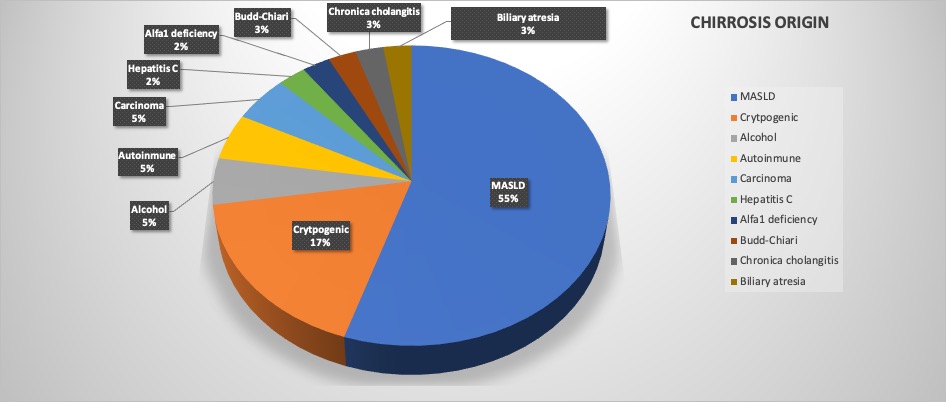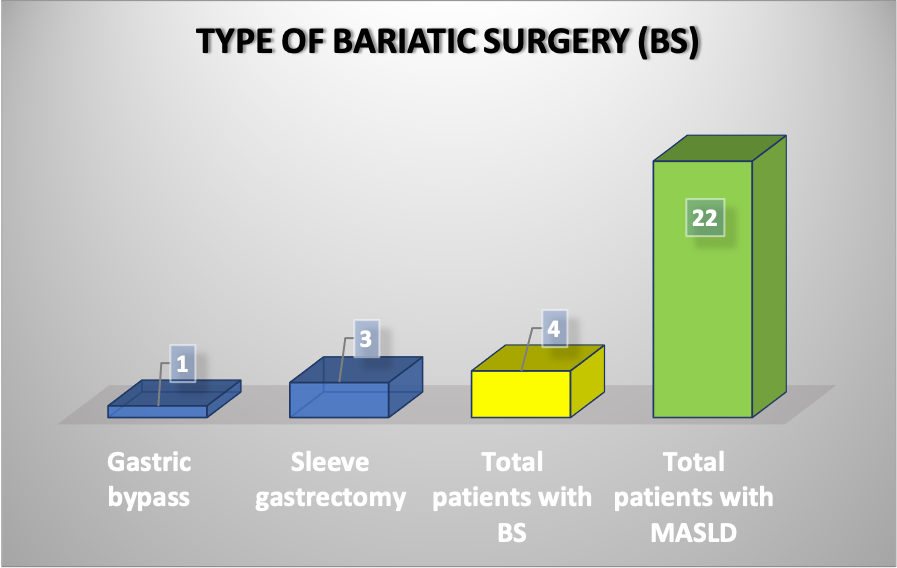When is the best time to perform bariatric surgery in patients with liver transplantation and obesity? initial experience in a small hospital center
Ernesto Duarte Tagles1,2,3, Martha S Pérez Cornejo4,5,7, Luis C Rodríguez Sancho1, Alejandro Lugo Baruqui1, Salvador Castillo Barón1, Marisela Correa Valdéz1, José A Portugal Lazcano1, Mario A Flores León1, Natalia Rodríguez Payán2, Gilberto Ungson Beltrán6.
1Transplant department, Hospital CIMA Hermosillo, Hermosillo, , Mexico; 2Surgery department, Hospital San José de Hermosillo, Hermosillo, , Mexico; 3Transplant deparment, Hospital General del Estado del Estado de Sonora, Hermosillo, , Mexico; 4Organ office coordination, Hospital CIMA Hermosillo, Hermosillo, , Mexico; 5Intensive care unit, Hospital San José de Hermosillo, Hermosillo, , Mexico; 6Bariatric surgery deparment, Hospital CIMA Hermosillo, Hermosillo, , Mexico; 7Organ office coordination and Intensive care unit, Hospital General del Estado del Estado de Sonora, Hermosillo, , Mexico
Backgrounds: MASLD is important cause of liver transplantation worldwide. Perioperative management of liver transplant (LT) can be difficult because metabolic syndrome. Overweight compromises survival rates of LT mainly due to cardiovascular complications and diabetes but also because fatty deposits within the transplanted livers. Transplant teams have created programs to reduce patients’ weight when transplanting cirrhotic patients with MASLD but dilemma of when it the best time to do bariatric surgery (BS) in liver recipients is a major concern: before, during or after transplant. We present our preliminary results.
Methods: analyzed patients overcome with liver transplant and bariatric surgery.
Results: In 55% of liver transplant, MASLD caused cirrhosis. 4 had bariatric surgery: 2 previous to transplant, 1 during transplant and 1 within 3 months after liver transplant.

Because 2 patients had compensated liver disease (CHILDPUGH A6/B7), went under bariatric surgery prior to transplantation; but at moment of transplant, they had a significant decompensation (MELD 34/38) with weight loss over 80%; patient with gastric bypass died after a month, second patient is ok, now BMI 23. Patient with bariatric surgery during transplant, had no problem during surgery and decided sleeve gastrectomy at end of transplant without complications; after 6 years has BMI 24 and good graft function. Post-transplant sleeve gastrectomy patient, decided not doing during transplant because patient's bad physiological conditions, instead did it after 3 months, currently has good graft function and BMI 29.

Conclusion: MASLD is becoming number one cause of liver cirrhosis in Mexico, where obesity is huge problem. Regarding bariatric surgery and liver transplant, preliminary experience shows:
1) Prior transplant, is high risk because coagulation disorders and portal hypertension; besides, weight loss can be so much that leads to decompensation, worsening patient’s condition,
2) Post-transplant, no coagulation disorders and portal hypertension, but adhesions can hinder an optimal gastrectomy, leaving larger pouch, not allowing optimal weight loss.
3) Believe best time to perform BS is at end of transplant, better sleeve gastrectomy to avoid malabsorption. Timing must be defined by patient's condition and anesthesiologist's evaluation.
